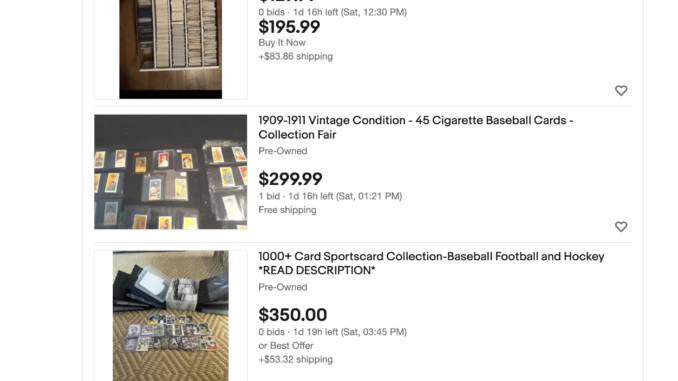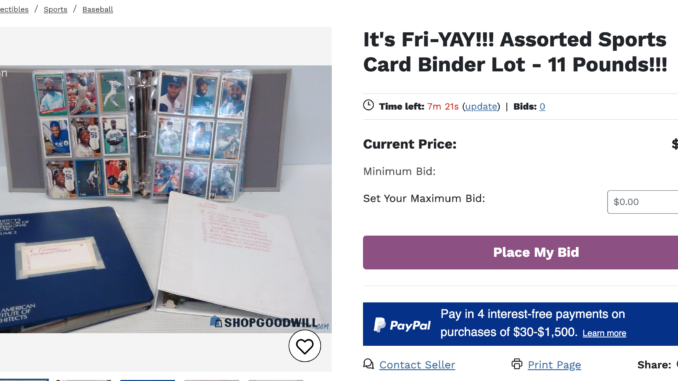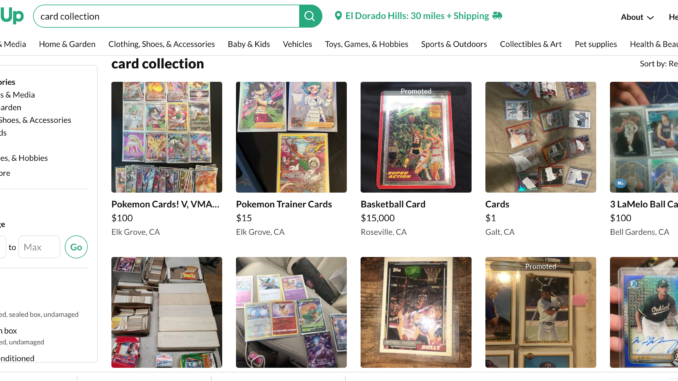One thing that really got me interested in cards was the collection treasure hunt. Getting up early with my dad to head out to the flea market and/or garage sales was such a formative and memorable experience for me.
The thrill? Finding bulk collections and getting your hands on rare and valuable cards. It can be a life-changing experience, and for me, it quite literally was—here I am spending a lot of my time blogging about cards to this very day.
It’s a hobby (and business) that leads to excitement, and potentially rewarding and profitable outcomes.
That being said, knowing where to search for bulk card collections and the specific cards to look for is crucial before you start going out on your hunts in order to ensure you are spending money wisely, and not leaving great cards on the table (or in boxes).
So, whether you are just getting into the hobby, starting a business, or looking to add to your existing collection, buying in bulk in search of hidden gems or flipping it all for a profit could be the action for you.
Where Find Bulk Card Collections
To get you thinking, here is a list of places where you can find large sports card collections:
Online Marketplaces
eBay is still the head honcho when it comes to buying and selling collectibles. And while the platform is more geared toward singles and graded cards, you are definitely still able to buy collections on eBay in bulk.
As a buyer, the good thing about eBay is that you might have people who are treating the site as an online garage sale, where they can simply upload a few pics and add a little info in an attempt to get rid of all of their cards (or their child’s, parent’s, etc.) at once. For you, that might mean hidden card gems, but it could also mean more risk, and nothing at all as a result.

With that said, one thing to watch out for: many eBay sellers will “dress up” card lots to make them look and feel like unsearched collections, where in reality the seller probably has a very good idea of the included cards, and thus, the chances of finding anything extremely valuable decrease dramatically. This isn’t always the case obviously, and over time you’ll get a better feel for things, but it’s worth pointing out.
If eBay isn’t the place for you, Mercari is another online marketplace where you can commonly buy sports card collections that many people know of, and Goodwill has plenty of baseball cards, with ShopGoodwill.com being one that seems to be growing more popular by the day.
Like eBay, though, while these marketplaces offer shipping, it can be costly depending on how large the collection. They also have high user bases, which means more competition.

Social Media Marketplaces
Facebook has a marketplace of its own that is unmatched for finding local neighbors selling sports cards. Again, there is a lot of competition so it’s important to be diligent to find the best deals. For a leg up, you can set alerts so you are notified when sports cards are posted in your area.
Facebook also has groups you can join—you’ll probably be surprised to find that there are many sports cards buying, selling, and trading groups, as well as buying and selling groups around your community.
Online Classifieds
While many people see Craigslist as a thing of the past with the rise of Facebook marketplace, Craigslist offers a different user base and thus additional opportunities to buy card collections. Meaning, you can find listings that you would not find on Facebook.
Read More: Selling Sports Cards in Bulk
Not to mention that on Craigslist, you can also search other surrounding areas if you are willing to drive. For a leg up here, searching rural towns and lower-populated counties or cities can turn up great results. That said, there are typically fewer posts in these areas, but there is also less competition from buyers.
Now, for those who want the local feeling of Craigslist but with an updated interface and user experience, OfferUp most closely resembles that. Think of it as a mix between Mercari, which is primarily an app-driven experience, and Craigslist, where your neighbor just a few streets down might be selling their cards.
Just FYI, OfferUp also has a shipping component, meaning you can in fact search for card collections outside of your local area.

Garage Sales & Flea Markets
We all hear stories of “holy grails” being found at garage sales and estate sales—it’s the stuff dreams are made of. Meaning, if you want the best chance of finding collections of boxes of cards that have been sitting in someone’s basement for 60 years, this is probably it.
Now, to set expectations, while it is extremely unlikely you will find anything insanely valuable, it is probably worth it to stop by sales and see for yourself for a weekend or two. This is especially true if you are into older vintage sports cards and collectibles—being well-read on cards from the 1970s and earlier can give you a great idea of gems to look for, but always take the condition of the cards into consideration.
Personal Network
Arguably the best bulk deals you find might be from word of mouth within your personal network. It’s simple—if you start collecting, let your friends and family know about your new passion. Show off your cards and be proud of what you are doing. If people know you enjoy collecting and buying card collections in bulk, they will recommend you when they hear of people looking to sell or get rid of their own.
There are thousands of people out there that have massive collections of cards they want to get rid of and just don’t have the patience or desire to sort through everything or list them for sale. Hearing about this person (you) from a friend can lead to finding some really amazing stuff.
What to Look For When Buying Collections
Now, when you finally get your hands on a collection of cards—great! But now what? Well, it’s time to start digging through them! But before diving in, you need to know what you’re looking for.
To be honest, cards have evolved far beyond even these basics, but here is some info to help get you started.
Rookie Cards
Oftentimes the most valuable cards you’ll find are rookie cards. These will typically be marked with an “RC” stamp somewhere on the face of the card, and potentially with other telling markings.
Other times, while not a true “rookie card,” the 1st Bowman chrome cards of special players will typically be even more valuable.
There is more to know, though, so here are some additional resources to help your familiarity:
Base vs. Insert vs. Parallel
Additionally, you want to know the difference between a base card and an insert or parallel. A base card is the standard card you’ll find in a master set of cards. Meaning, it’s quite common.
An insert is a card is essentially a subset within that main set. There are also different variations and parallels of both types of cards. These different cards will typically have color or “numbered” variations. Numbered cards will tell you exactly how many of that particular card was produced. For example, if you have a card numbered 15/99, you have the 15th card printed out of a total of 99.
Some variations are rarer than others, so researching and learning about all of the different possibilities will help you know what to look out for when buying sports cards.
Sets to Collect
One last great thing about sports card collecting and buying in bulk is that you’ll begin to accumulate a lot of cards out of the same set. Like anything, sets vary in value, but if you are starting a personal collection, you can take things in any direction you’d like.
One misconception people have when getting into cards is “the older the better.” While there is some truth here, it could also be wildly incorrect. For example, during the mid 1980s through the early 1990s, sports cards were severely overprinted. There were so many people collecting and holding boxes that the cards produced during this time haven’t held much value. This is commonly referred to as the “junk wax era.”
Of course, there are some exceptions with valuable cards from this time, but it is important to be cautious if you are buying large collections because every single one of them seems to be filled with at least some combination of 1991 Fleer, 1990 Donruss, and others.


![Which Panini Football Cards are the Best? [Updated for 2023]](https://ballcardgenius.com
/wp-content/uploads/2022/05/Which-panini-cards-are-the-bestblog-header-1025x547.png)